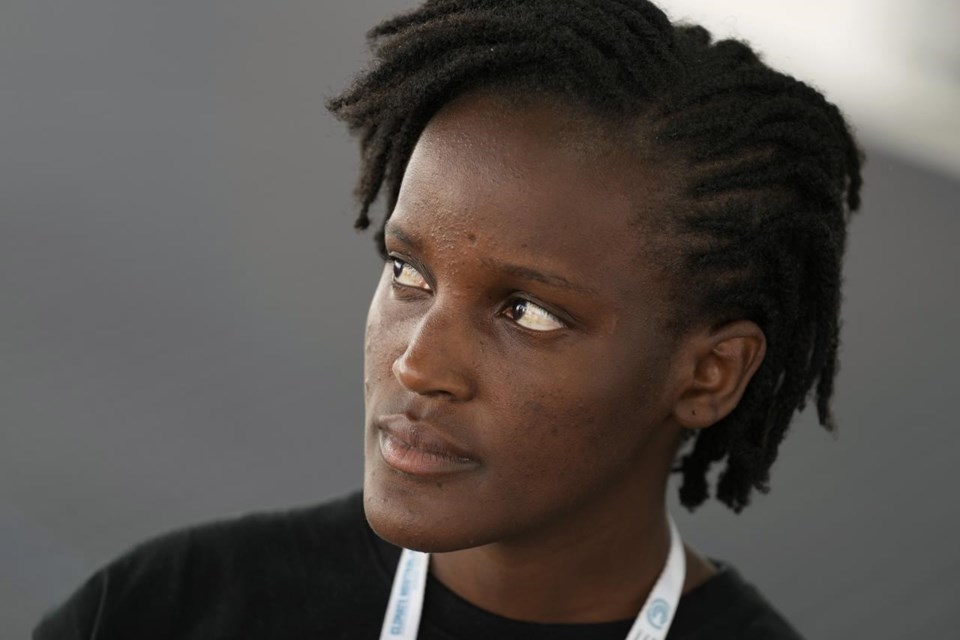SHARM EL-SHEIKH, Egypt (AP) — With an end-of-the-week deadline rushing at them faster than agreements are coming out of them, negotiators at the U.N. climate summit were in a difficult spot Wednesday.
Talks in the Red Sea resort of Sharm el-Sheikh got off to a plodding start and are behind the pace of previous meetings as government ministers returned to Egypt to take over negotiations with three days left before the scheduled close Friday.
“I think we still have a long way to go. But I remain hopeful that we can come to good conclusions,” the European Union's top climate official, Frans Timmermans, told The Associated Press.
Demands for rich nations to provide additional aid for vulnerable countries suffering devastating impacts from climate change have become a major point of division at the two-week meeting.
Developed countries such as the United States have long resisted the idea of “loss and damage” for fear of being held financially liable for the carbon dioxide they’ve pumped into the atmosphere for decades.
But there has been a softening of positions among some rich nations that now acknowledge some form of payment will be needed, just not what.
“Countries that are particularly affected, who themselves bear no blame for the CO2 emissions of industrial nations such as Germany, rightly expect protection against loss and damage from climate change,” German Foreign Minister Annalena Baerbock said. She later conceded that an agreement on the issue might not be possible in Egypt, however.
Timmermans, who is the EU’s executive vice-president, echoed that view.
“We’re all willing to find some substantial steps forward, but we’re not there yet,” he said.
Small island states, who are among the most vulnerable to sea-level rise resulting from global warming, said they were concerned the issue could scupper the negotiations.
“The inaction of many developed countries has the potential to stall talks and land a devastating blow to the hopes of the developing world for the establishment of a loss and damage funding facility,” said Conrod Hunte, a senior diplomat from Antigua and Barbuda.
Former Irish President Mary Robinson, who is also chair of the Elders group of former global leaders, urged negotiators at the climate talks to take a “real decision” on climate financing to vulnerable countries.
“We need to see a landing that brings money to the most vulnerable,” she told The AP on the sidelines of the climate conference in Egypt.
Robinson called for global financial institutions, including the World Bank and the International Monetary Fund, to free more funds to help vulnerable nations recover and be prepared for climate change impacts.
“They actually have ways of opening up their lending much more without losing their triple-A rating,” she said.
Ugandan climate activist Vanessa Nakate also criticized the continued discussion and resistance from some countries to establish a loss and damage financing structure. She also called for governments around the world to phase out fossil fuels to keep the Paris accord's target of limiting temperature rise to 1.5 degrees Celsius (2.7 degrees Fahrenheit).
“It’s important that we not only address the issue of loss and damage, but also address the root cause of loss and damage,” she said.
That objective got a boost when the Group of 20 leading and emerging economies meeting in Bali ended with a statement that endorsed the 1.5 degree target and made 49 references to climate.
between the United States and China at the Group of 20 meeting in Bali also boosted hopes that the world's top two polluters can help get a deal over the line in Egypt.
U.S. climate envoy John Kerry confirmed Wednesday that he and his Chinese counterpart Xie Zhenhua had after they were frozen three months ago by China in retaliation for U.S. House Speaker Nancy Pelosi’s trip to Taiwan.
The middle of the second weeks of climate summits in general are “a deep valley of anxiety,” said Christiana Figueres, the former United Nations climate chief who was at more than 20 summits but not the one in Egypt. She said that’s because there is such a big desire for something to come out of talks, but "it’s also the moment in which people begin to be much more aware of the short time horizon that is left to be able to deliver something by Friday.”
That pressure “makes us act on the double and hopefully be more creative and also more conciliatory than we were perhaps in the first week,” Figueres said.
Alex Scott, climate diplomacy lead at the think tank E3G, said the slow progress made during the first week mean there’s “a few late nights to come” to try to find compromise areas.
“There’s so much frustration and anger boiling over’’ from developing nations that have been talking about the issue since 1991, said Alden Meyer, a longtime climate negotiations analyst at E3G.
Meanwhile, Brazilian President-elect Luiz In√°cio Lula da Silva at the talks in Egypt.
In two appearances, da Silva told cheering crowds that he would crack down on illegal deforestation in the Amazon, reinitiate relationships with countries that finance forest protection efforts and push to soon host a world climate summit in the rainforest.
Brazil's efforts on climate change are seen as vital because its Amazon rainforest territory provides a vast “carbon sink” to the world where emissions can be stored, whereas deforestation would fuel global warming.
___
Follow AP’s climate and environment coverage at
___
Associated Press climate and environmental coverage receives support from several private foundations. See more about AP’s climate initiative . The AP is solely responsible for all content.
Frank Jordans, Samy Magdy And Seth Borenstein, The Associated Press




